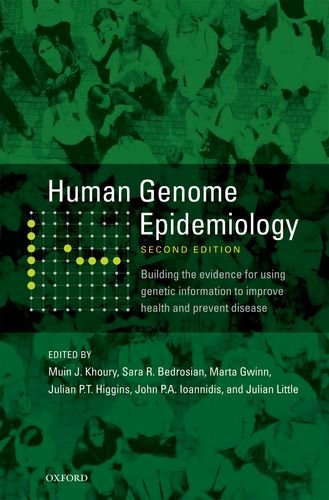مشاهده سبد خرید “Gardner and Sutherland’s Chromosome Abnormalities and Genetic Counseling 2018” به سبد خرید شما اضافه شد.
Human Genome Epidemiology, 2nd Edition: Building the Evidence for Using Genetic Information to Improve Health and Prevent Disease 2010
دانلود کتاب پزشکی اپیدمیولوژی ژنوم انسانی، ویرایش دوم: ایجاد شواهد برای استفاده از اطلاعات ژنتیکی برای بهبود سلامت و پیشگیری از بیماری
دسته: اپیدمیولوژی, بیماری ها, پزشکی, ژنتیک
| نویسنده |
John Ioannidis, Julian Higgins, Marta Gwinn, Muin Khoury, Sara Bedrosian |
|---|
| تعداد صفحهها |
676 |
|---|---|
| نوع فایل |
|
| حجم |
4 Mb |
| سال انتشار |
2010 |
89,000 تومان
دانلود ۳۰.۰۰۰ کتاب پزشکی فقط با قیمت یک کتاب و ۹۹ هزار تومان !
توضیحات
اولین ویرایش اپیدمیولوژی ژنوم انسانی، که در سال 2004 منتشر شد، به این موضوع پرداخته است که چگونه رویکرد اپیدمیولوژیک، مبنای علمی مهمی برای مطالعه پیوستار از کشف ژن تا توسعه اطلاعات ژنوم انسانی و کاربردها و ارزیابی آن در بهبود سلامت و پیشگیری از بیماری ها فراهم می کند. از آن زمان، پیشرفت در ژنومیک انسانی با سرعت خیره کننده ای ادامه یافته است و با مشارکت رهبران این حوزه از سراسر جهان، این ویرایش جدید نگاهی کاملاً به روز به روش های مطالعه عوامل ژنتیکی در بیماری های رایج است. پیشرفتهای روششناختی در جمعآوری، تجزیه و تحلیل و سنتز دادهها و همچنین مسائل مربوط به کاربردهای خاص اطلاعات ژنومی انسان در پزشکی و سلامت عمومی مورد بحث قرار میگیرد. علاوه بر این، این کتاب بر کاربردهای عملی تنوع ژنوم انسان در عمل بالینی و پیشگیری از بیماری تمرکز دارد. دانشجویان، پزشکان، متخصصان بهداشت عمومی و سیاست گذاران این کتاب را ابزاری مفید برای درک رویکردهای در حال تکامل سریع برای کشف و استفاده از اطلاعات ژنتیکی در پزشکی و بهداشت عمومی در قرن بیست و یکم خواهند یافت.
توضیحات(انگلیسی)
The first edition of Human Genome Epidemiology, published in 2004, discussed how the epidemiologic approach provides an important scientific foundation for studying the continuum from gene discovery to the development, applications and evaluation of human genome information in improving health and preventing disease. Since that time, advances in human genomics have continued to occur at a breathtaking pace.With contributions from leaders in the field from around the world, this new edition is a fully updated look at the ways in which genetic factors in common diseases are studied. Methodologic developments in collection, analysis and synthesis of data, as well as issues surrounding specific applications of human genomic information for medicine and public health are all discussed. In addition, the book focuses on practical applications of human genome variation in clinical practice and disease prevention. Students, clinicians, public health professionals and policy makers will find the book a useful tool for understanding the rapidly evolving methods of the discovery and use of genetic information in medicine and public health in the 21st century.




